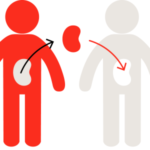Kidney patients who hope to get their much-needed transplant can take a big sigh of relief now that the Department of Labor (DOL) Secretary, Alexander Acosta, clarified language that states organ donors qualify for FMLA time-off work. This means that living kidney donors are included in FMLA’s protections for an eligible employee to take up to 12 workweeks of leave (for the surgery and recovery) while they are unable to perform their job functions, without risk of losing their job.
The TransplantFirst Academy applauds Paul Conway, former Chief of Staff of the U.S. Department of Labor, who also serves as President of American Association of Kidney Patients (AAKP) and Chair of the Patient Engagement Advisory Committee of the U.S Food and Drug Administration (FDA) for his role in achieving this massive victory. This united effort also included top kidney community allies, such as the American Society of Nephrology (ASN), the American Society of Transplant Surgeons (ASTS), the American Society of Transplantation (AST) and the Renal Physicians Association (RPA).
For medically-eligible kidney patients, organ transplants are the best treatment available for kidney failure. Transplants help kidney patients either proactively avoid dialysis altogether by securing a preemptive transplant or by allowing them to transition off of dialysis treatment dependency so they can enjoy a vastly improved quality of life. Currently, in the United States, over 114,000 patients are on the organ donation waiting list and of those, over 95,000 are awaiting a kidney transplant.
FLMA wins like this not only encourage more living organ donations for the tens of thousands of Americans who await a life-saving transplant, it helps gain momentum for passing further protections for organ donors, through the Living Donor Protection Act (H.R. 1270).
Learn More about FMLA Opinion Letter here:
https://www.dol.gov/whd/opinion/FMLA/2018/2018_08_28_2A_FMLA.pdf
Learn More About AAKP Efforts Here:
https://aakp.org/press-release/labor-secretary-acosta-earns-patient-praise-organ-donor-job-protections-eve-labor-day-weekend/
Learn More about Living Donor Protection Act here:
https://www.congress.gov/bill/115th-congress/house-bill/1270






 TransplantFirst Academy is raising community awareness in living kidney donation.
TransplantFirst Academy is raising community awareness in living kidney donation.